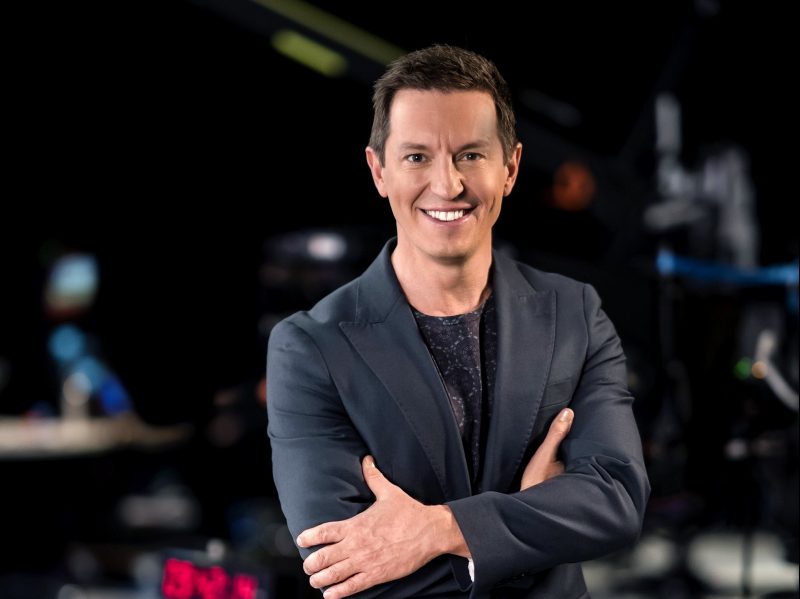Say hi to your mum for me: Why Rove is confident he can take back Saturday night
Saturday night isn’t exactly a hot spot for television viewers – beyond sport or movie reruns, there isn’t much that can draw a viewer’s eyes to the box. But Rove McManus is confident he’s got the right antidote to dire Saturday night programming. He tells Mumbrella’s Hannah Blackiston why he thinks viewers are ready for Saturday Night Rove.
It wasn’t necessarily the next place we thought we’d see Rove McManus, but last year, during Ten’s first Pilot Week, there he was. 10 years after he’d told us to say hi to our mums for him for the last time, Rove was back on our screens with Bring Back Saturday Night, a return to the live comedy/ talk show format that made him famous all those years ago on Rove Live. Pulling 203,000 metro viewers, the show wasn’t the most-watched of the pilots, but it was commissioned for a 2019 season.
That season will kick-off tomorrow, and in the lead up I was granted a quick phone interview with Rove, who was no doubt in the middle of the kind of hardcore press round one has to embark on when they’re mononymous. Despite that, he was incredibly friendly and perky when I spoke to him, and was keen to tell me why he believes audiences are ready to return to Saturday nights on the couch.



Rove has his tense all wrong. There WAS and audience there. HHIS stopped production because that was changing it it hadn’t changed already. This will be like Sunday Night Takeaway but worse, as Ch10 are not great promoters of their own content. Following tiny ratings, this show will be cancelled as soon as is contractually possible.
And your grammer sucks!
Rove rocks
Haha your grammar sucks!
Rove has his moment in 2001, but its gone now. FADE away like Daryl Sommers…
Daryl summers had a number one show for over 25 years. What are you even talking about? Rove has had zero successful shows and is an utter fraud. Daryl, whilst a weird dude, had a great show for a quarter of a century. Get your facts right fella – no idea.
This should give hope to the other 136 people who hosted the 2DayFM breakfast show over the past six years.
Rove who? Didn’t he leave Australia to make his career elsewhere?
How’d that go?
And your grammer sucks!
Rove rocks
* Grammar
Your spelling sucks
I got my gear off in London about 18 years ago to say hi to Rove’s mum. It was about 5 degrees Celsius and I’d like to ask if his mum got the message and I hope it was worth it, cause I got man flu…?♂️
Rove has never , ever , ever had a good show that has succeeded. He is not funny and is basically boring as. He is everything wrong with free to air TV – no new ideas, old boring talent who is just NOT funny. How desperate is it when he keeps getting gigs after soooo many failed TV shows. People – HE’S JUST NOT FUNNY. Move on.
It wasnt bad but i think personally this is the wrong time slot im a mother of 2 very unhappy of the show too many swear words is this what it comes down to teaching our kids to watch these kind of shows. Back in the good old days rove was more layed back less swearing unfortantly this is not the kind of thing i want to teach my 10 yr old child. Im in my mid 40s im hoping channel 10 will do something about this… Take in consideration 7 30pm saturday night live with unpleasent language a family show reallyyyyyyyyyyyyyyy??
Really Liz… wrong forum.
All the distressed and hysterical mothers are protecting their children’s delicate ears over in the AdNews comments
I watched it last night as I changed channel pretty much 10 minutes into the program as I felt I was watching the interview show on channel 10 especially when rove was talking to Jessica Melboy etc.
I was expecting a big band show with rove sitting on desk speaking to his guests, I think rove should bring back a Saturday night show like he did last time he was on air.
Just like the David letterman show or jimmy fallon show , you know what I mean .
Rove should of started his show a little later cause the footy is on and I am sure people would rather watch NRL matches